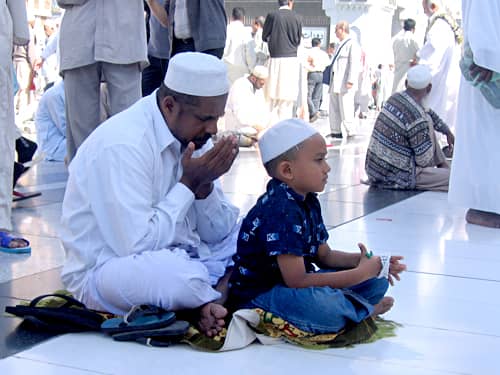This year, among the many things for which I am unendingly thankful, is my recovery from the fevers of religious intolerance. I first shared my experiences during the three year anniversary of 9/11, in which I discussed how I was isolated and alienated from my American-ness because of my childhood experiences. I grew up facing an extreme dislike, when not outright hatred, for my skin color. As I grew older, this dislike was replaced with ridicule for my religious beliefs and commitments, and as I graduated high school, I never felt like I was truly an American. I never owned my American-ness. This isolation led me to the edge of a cliff of spiritual crisis, and from it I plunged into the depths of spiritual darkness.
As I began my tenure at Marquette University, this sense of alienation was heightened even further. I was the first-born in my immediate family, and it was always difficult for me to stay away from my parents when I was growing up. I rarely stayed over at friends' or relatives' houses as a child, and when I did, I would frequently cry for "mommy." On my first day at Marquette, I wanted to call for "mommy." But, my mommy was thousands of miles away. She and the rest of my family joined my father in Seoul, South Korea, where my father was assigned to work by his engineering firm. For the first time in my life, I was all alone.
It was a gloomy Wednesday in late August as I pulled my Buick Somerset--packed with all my possessions at that time--up to the front of my new home on campus. I did not know where I was going, as I had never been to downtown Milwaukee before. I felt sick to my stomach. I managed to get my belongings into my dorm room, but the first few nights were very lonely. As new student orientation progressed, I began to feel better about college; I was ready for the academic challenge...little did I know of another challenge that was yet to befall me.
Marquette University is an overtly Catholic institution. There are churches, chapels, priests, and crucifixes everywhere. This intimidated me, and I felt even more of an outsider than I had already did. Furthermore, every student is required to take theology, and so for the first time I was studying the details of Trinitarian theology.
On top of all this, even though my dorm-mates were all close friends, I felt totally alone. I could not relate to any of my shoolmates. They were all Christian, I was Muslim. They all drank and went to parties; I stayed home alone on Friday and Saturday nights. Most, if not all, dated and had girlfriends; I was waiting until marriage.
With each day, my doubts grew stronger, my questions became increasingly persistent, and my fear that I was on the wrong path to the Almighty became ever more intense. All these feelings came to a head one day: the day I decided to leave Islam.
Ironically, I had just finished completing the afternoon prayer when I decided to turn to Christianity for my salvation. I had always hated being left out, and I definitely did not want to be left out of Paradise. Yet, as I left Islam, I did not rush to the church to get baptized. I did not seek the dorm chaplain out and make my confession. I did not go the church and profess my faith. I simply sat there, transfixed, after my prayers that day. Somehow, I simply could not bring myself to accepting Christ--a Prophet whom I was raised to honor and love and one whom I still honor and love--as my God.
Thus, as I continued to sit there, I found myself migrating back to Islam. Although my mind's incessant questions took me out of the faith, ultimately it was my heart that led me back to it.
I rededicated my faith in Islam by re-uttering the shahadah, or declaration of faith: "I bear witness there is nothing worthy of worship besides God, and Muhammad is His Messenger and Servant." I spoke to some of my closest Muslim friends about my experience, and I also began to search my soul for why my faith had weakened to the point of apostasy. I was told a number of things: I was around non-Muslims "too much;" I was unmarried; my faith, quite simply, was just plain weak. I took their counsel to heart, but I made up my own mind about why I had left the only faith I had ever known. And the conclusion I made turned out to be utterly disastrous.
In the years that followed, I burned in the fires of arrogant religiosity. I was possessed by the demons of narrow-minded thinking. Although my affliction began in earnest relatively late in my life (in my early 20s), the incubation period--or time it takes for a disease to fully manifest its symptoms--took many, many years, starting on that fateful day in college.
Now, in the aftermath 9/11, I have found a new, more tolerant and more meaningful faith, and a place for myself in this country I would never have imagined. And on Thanksgiving, I can only thank God.

